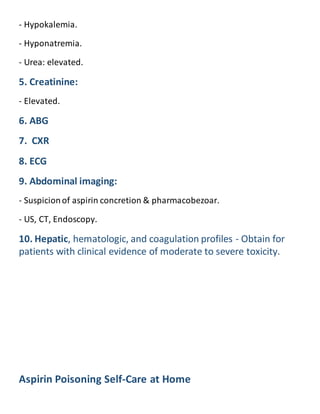
These symptoms can mimic those of acute kidney failure.
Administration of steroids can cause vomiting and stomach ulceration as well as increased thirst, urinations and urine dilution. Administration of other non-steroidal anti-inflammatory medications such as Rimadyl®, Etogesic®, phenylbutazone, flurbiprofen, and ibuprofen may cause identical symptoms as those caused by aspirin toxicity. Other diseases can have symptoms that appear similar to aspirin toxicity. Spontaneous bleeding may also occur causing pinpoint bruises to appear in the skin and on the gums (petechiae). Disruption of platelet function increases the amount of time it takes the blood to clot after being cut. Aspirin interferes with platelets, which are responsible for helping the blood to clot. The symptoms of acute kidney failure are almost identical to the gastrointestinal symptoms of aspirin toxicity. Owners may also notice that the urine is dilute (lighter in color) when the dog urinates. Aspirin toxicity can cause acute kidney failure with symptoms such as vomiting, diarrhea, loss of appetite, lethargy, extreme thirst, and dilute urine.  Neurological symptoms may include restlessness, anxiety, depression, incoordination and (rarely) seizures.
Neurological symptoms may include restlessness, anxiety, depression, incoordination and (rarely) seizures.  Aspirin stimulates the brain’s respiratory center so most dogs will pant excessively, although the dog may also experience extreme mental depression with decreased respirations. Gastric (stomach) and intestinal bleeding may cause bloody vomit and melena (black, tarry stools).
Aspirin stimulates the brain’s respiratory center so most dogs will pant excessively, although the dog may also experience extreme mental depression with decreased respirations. Gastric (stomach) and intestinal bleeding may cause bloody vomit and melena (black, tarry stools). 
Aspirin toxicity can lead to ulceration of the stomach or intestine and, in extreme cases, stomach or bowel perforation that causes a severe, life threatening, bacterial infection of the abdomen. The most common symptoms of aspirin toxicity are the gastrointestinal effects such as loss of appetite, abdominal pain, nausea, vomiting, black stools and lethargy.Gastrointestinal problems are common in dogs whereas central nervous system depression is most common in cats. Young animals are more susceptible to the toxic effects than are adult animals.Īspirin toxicity may cause gastrointestinal problems, respiratory difficulties, neurological problems, bleeding disorders, and kidney failure. Aspirin toxicity usually occurs because of the ingestion of improperly stored drugs or the administration of the incorrect dose of aspirin.Ĭats are more susceptible to the effects of aspirin than are dogs because they are unable to metabolize the drug as quickly. Aspirin toxicity (salicylate toxicity) is poisoning that occurs following the ingestion of aspirin or aspirin-containing products.







 0 kommentar(er)
0 kommentar(er)
